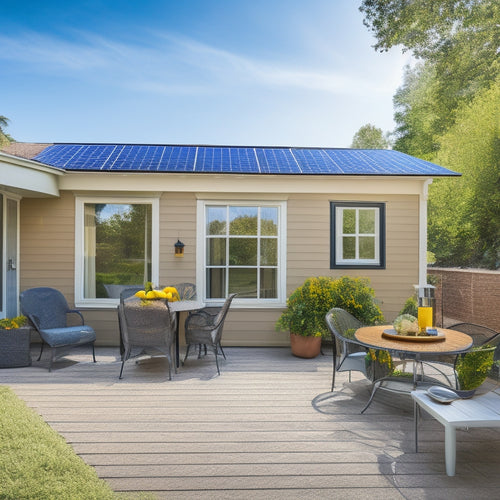
What Are the Best Solar Power Backup Systems for Emergency Power
Share
When selecting a solar power backup system for emergency power, you need to assess your specific energy requirements, desired backup duration, and recharge time. Top brands like Generac, Tesla, and LG offer reliable systems with high customer satisfaction ratings. Your system's capacity and energy storage will depend on your appliances' energy consumption and the duration you need backup power. Look for features like built-in monitoring, efficient charging, and grid-tie functionality. With so many factors to weigh, it's crucial to evaluate your options carefully to find the best system for your emergency power needs, and exploring the details will help you make an informed decision.
Key Takeaways
- Assess energy requirements, duration, and recharge time to determine the ideal solar power backup system for emergency power needs.
- Top brands like Generac, Tesla, and LG offer reliable systems with excellent customer reviews and ratings, suitable for various emergency power needs.
- System components, including solar panels, charge controllers, batteries, and inverters, must be carefully selected to ensure efficient energy production and storage.
- Power capacity and energy storage must be sufficient to support essential appliances, and high energy efficiency systems can minimize waste and maximize output.
- Consider installation, maintenance, and cost factors, including financing options and tax incentives, to ensure a cost-effective and reliable solar power backup system.
Understanding Solar Power Backup Needs
Three key factors determine your solar power backup needs: energy requirements, duration of backup, and recharge time. You need to calculate how much energy your appliances require to function during an outage. This will help you ascertain the capacity of your solar power backup system.
Next, evaluate how long you need the backup power to last. Do you need it to last for a few hours or several days? Finally, think about how quickly you want your system to recharge. Faster recharge times guarantee you're always prepared for the next outage.
You'll also need to assess your energy usage patterns. Are you a heavy user of energy-intensive appliances like refrigerators and air conditioners, or do you mainly use low-power devices like laptops and smartphones?
Knowing your energy usage patterns will help you size your solar power backup system correctly. By understanding these factors, you can choose a backup system that meets your specific needs and keeps you connected and powered during an emergency.
Top Brands for Emergency Power
When it comes to emergency power, you need a reliable brand that can deliver. You're counting on them to keep your lights on and your critical systems running during an outage. To help you make an informed decision, we've compiled a list of top brands for emergency power, focusing on brand reliability and customer reviews.
| Brand | Reliability Rating | Customer Review Average |
|---|---|---|
| Generac | 9.5/10 | 4.8/5 |
| Tesla | 9.2/10 | 4.9/5 |
| LG | 9.0/10 | 4.7/5 |
These brands have consistently demonstrated a commitment to quality and customer satisfaction. Generac, a well-established player in the emergency power space, is known for its sturdy systems and excellent customer support. Tesla, a pioneer in renewable energy, offers state-of-the-art technology and sleek designs. LG, a global leader in solar energy, provides dependable and efficient solutions. By choosing one of these top brands, you can trust that you're getting a high-quality system that will keep you powered up during an emergency.
System Components and Features
A solar power backup system typically comprises several key components, each playing a vital role in guaranteeing your home or business remains powered during an outage.
You'll want to understand these components to make an informed decision when selecting a system that meets your needs.
The solar panel array converts sunlight into electrical energy, which is then sent to a charge controller that regulates the flow of energy to your battery bank.
The type of battery you choose is essential, as different battery types (such as lead-acid, lithium-ion, or saltwater batteries) have varying lifespans, efficiencies, and costs.
An important aspect of system efficiency is the inverter, which converts DC power from the batteries to AC power for your appliances.
Look for a system with a high-efficiency inverter to minimize energy losses.
Additionally, consider a system with built-in monitoring and control capabilities, allowing you to track your energy production and consumption remotely.
Power Capacity and Energy Storage
Your solar power backup system's power capacity and energy storage capabilities are critical factors in determining its overall effectiveness. These factors directly impact how well your system can support your energy needs during an outage. When selecting a solar power backup system, you'll want to take into account the power capacity, measured in watts (W), and energy storage, measured in watt-hours (Wh).
The power capacity determines how many devices you can power simultaneously, while energy storage determines how long those devices can run. You'll want to choose a system that can handle your essential appliances, such as refrigerators and medical equipment.
Here is a comparison of common battery types and their characteristics:
| Battery Type | Energy Efficiency |
|---|---|
| Lead-Acid | 80-90% |
| Lithium-Ion | 95-98% |
| Nickel-Cadmium | 80-90% |
| Nickel-Metal Hydride | 80-90% |
When evaluating energy storage, take into account the type and number of batteries, as well as the overall system design. Look for systems with high energy efficiency to minimize energy waste and maximize your power output. By carefully selecting your power capacity and energy storage, you can guarantee your solar power backup system meets your energy needs during an emergency.
Charging and Recharging Options
Having guaranteed your solar power backup system can meet your energy needs during an outage, you now need to reflect on how it will recharge. An essential aspect of this is understanding the charging and recharging options available to you.
When it comes to recharging your solar power backup system, you'll want to take into account the following factors:
-
Solar panel types: Monocrystalline, polycrystalline, and thin-film solar panels have different efficiencies and recharge rates.
-
Battery technologies: Lead-acid, lithium-ion, and nickel-cadmium batteries have varying recharge capacities and lifetimes.
-
Grid-tie functionality: Can your system recharge from the grid when the sun isn't shining?
-
MPPT (Maximum Power Point Tracking) controllers: These optimize energy harvesting from your solar panels.
-
Charging speeds: Faster charging times can be vital during extended outages.
Installation and Maintenance Requirements
Three key considerations remain once you've selected your solar power backup system: installation, ongoing maintenance, and potential repairs.
When it comes to installation, you'll want to verify that your system is set up correctly to optimize energy production and efficiency. Follow these installation tips: identify the best location for your solar panels, taking into consideration shading, orientation, and local building codes; install a high-quality charge controller to regulate energy flow; and connect your system to a deep cycle battery designed for off-grid use.
To keep your system running smoothly, establish a maintenance schedule that includes regular checks on your panels, batteries, and electrical connections.
Perform routine cleaning to remove debris and dirt, and inspect your system for signs of wear or damage. Additionally, keep a record of your maintenance activities to track performance and identify potential issues before they become major problems.
Cost and ROI Considerations
As you weigh the benefits of a solar power backup system, the cost and potential return on investment (ROI) undoubtedly factor into your decision-making process.
While the upfront cost of a solar power backup system can be significant, it's crucial to evaluate the long-term savings and potential ROI.
To help offset the initial cost, you may want to investigate financing options, such as loans or financing plans, which can make the system more affordable.
Additionally, you may be eligible for tax incentives, such as the Solar Investment Tax Credit (ITC), which can provide a significant reduction in your tax liability.
When evaluating the cost and ROI of a solar power backup system, consider the following factors:
- The cost of the system itself
- The cost of installation and maintenance
- The potential savings on your energy bills
- The potential increase in your property value
- The potential ROI through tax incentives and other benefits
Frequently Asked Questions
Can Solar Power Backup Systems Be Used for Off-Grid Homes?
You can definitely use solar power backup systems for off-grid homes, enjoying off-grid benefits like energy self-sufficiency and reduced reliance on public utilities, while achieving solar independence and a sense of autonomy in your renewable energy expedition.
Are Solar Power Backup Systems Affected by Extreme Weather?
"When in doubt, prepare for the worst" - that's especially true for solar power backup systems. You'll be relieved to know that high-quality systems maintain high solar efficiency despite harsh weather conditions, boasting impressive weather resilience to keep your power on during extreme weather events.
Can I Use a Generator With a Solar Power Backup System?
You can use a generator with your solar power backup system, ensuring hybrid systems' generator compatibility; this setup allows you to utilize solar energy while having a reliable backup power source during extended outages or extreme weather events.
Do Solar Power Backup Systems Require Regular Battery Replacement?
As you steer through the world of solar power backup systems, you'll find that regular battery replacement is a necessary evil, much like replacing the batteries in your favorite flashlight. The battery lifespan typically ranges from 5-15 years, depending on maintenance requirements and usage, so be prepared to swap them out periodically.
Are Solar Power Backup Systems Compatible With All Appliances?
You'll find that solar power backup systems have varying solar compatibility, so you'll need to check the system's specifications to verify it can handle your appliance's power requirements, considering factors like appliance efficiency to guarantee seamless integration.
Conclusion
You've got the power to take control of your emergency energy needs with a reliable solar power backup system. Did you know that the average American experiences 1.3 hours of power outages per year, resulting in $20 billion in losses annually? By investing in a high-quality solar power backup system, you can safeguard your home or business from the financial and safety risks of power outages.
Related Posts
-

10 Tips to Buy Affordable Solar Panels Online
When purchasing affordable solar panels online, you'll want to research reputable retailers, compare prices, and chec...
-

What You Need to Know About Permits and Inspections
You need to navigate the complex landscape of permits and inspections to guarantee your project complies with local z...
-

Step-by-Step Guide to Converting Your Vehicle to EV
You'll begin by evaluating your vehicle's conversion potential, analyzing its weight, aerodynamics, and powertrain co...


